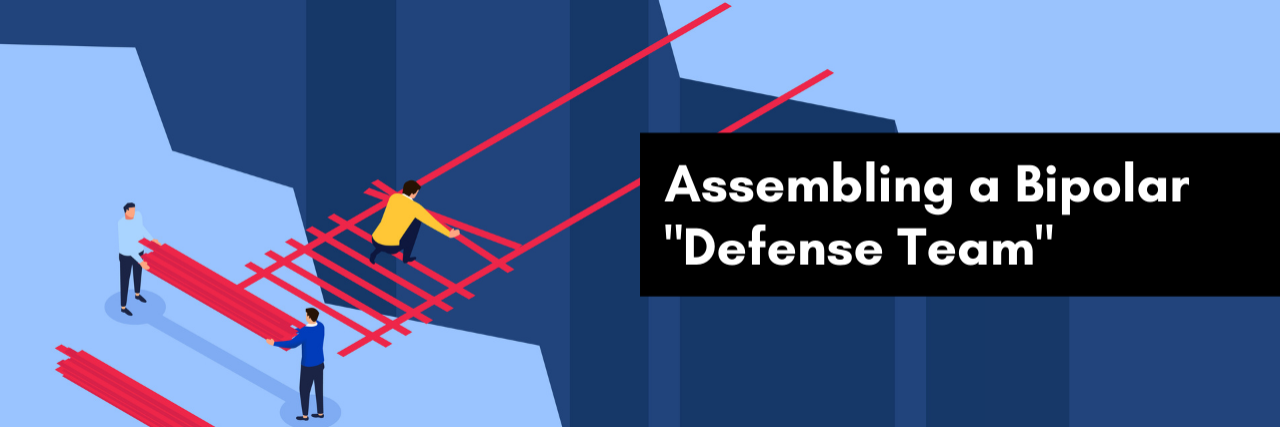My apartment was quiet this morning, until I stumbled to the kitchen for coffee. The attorneys in my brain arrived out of nowhere as I stirred in the cream. During meditation, they pointed out past failures as evidence that I deserved a life sentence of brokenness for my defects of character. The prosecution argued that mental illness was no excuse for the damage I’d done. Furthermore medication, meditation, support from others and therapy wouldn’t work. When I argued in my defense, the voices yelled their objections over my attempts to change my own mind. I felt alone and started sinking under the weight of racing negative thoughts.
• What is Bipolar disorder?
A big symptom of a depressive cycle is negativity that blindsides me, and the internal trial between guilt or innocence. I guided my awareness toward my breath, redirecting the courtroom drama in my head toward the reality of the present moment. I pictured my supportive community as my defense team and spoke their names as a mantra. And just like that, I snapped out of it. The trial only seemed real if I stayed stuck in my story. I said, “Case dismissed,” and texted this gratitude list to my friends:
Today, I’m grateful for coffee; for patience with myself and others when I’m in a depressive cycle; for writing down the contents of my head instead of staying stuck there; for melatonin for insomnia; and for boundaries with doors, windows and a security system, not castles with fire-breathing dragons in the moat, although dragons are cool.
I’ve had bullies in my brain since childhood. From sixth grade to my senior year, I was taunted, shamed and called a sissy and a fag by boys at school. No one defended me when I was punched, shoved, tripped and spat on. I was called a coward by my father, the same man who never taught me how to throw a punch, for not fighting back. I believed what others said about me. It was hard to defend myself without support. No matter how hard I tried, I felt I’d never be good enough or strong enough, so I stopped asking for help.
Perhaps bipolar disorder showed up to defend me, in response to years of abuse, pain and loss. Although it caused damage to me and others, it provided an escape to the sun, or down to the darkness and addiction to numb the pain. I was either “super human” or “sub-human”; I rarely knew the human in between. I considered these narrative questions with my therapist:
- What if bipolar disorder is neither good nor bad and just has misguided intentions?
- What parts of me do mania and depression represent?
- How does mania take me away from pain on the next nonstop flight?
- How does depression protect me when it fears the world wants to devour me?
- What alternative reality did bipolar disorder create when actual reality became too painful?
- Who or what might protect and support me instead of bipolar disorder?
If I accept bipolar disorder as neither good nor bad, I can dissolve the stigma and shame and teach my loved ones how to support me when I need it most. Here are examples that some of my clients shared (with permission), showing how others offer them support during a bipolar cycle. I’ve included some of mine as well:
- Virtual community support on TheMighty.com.
- Friends support me through depression with texts, memes and funny YouTube videos.
- Texting gratitude and receiving gratitude grounds me when I’m low.
- Sometimes my friend checks on me with the text, “What’s your weather forecast today?”
- When my tummy turns to jello and my brain turns to ice, I can always call my parents. They remind me that nothing lasts forever and that I’ve made it through every time.
- I have friends who share my love for Broadway musicals. Musicals take me away from my depressive, manic reality. I can go “Into the Woods,” sing with Madame Rose and Gypsy or fight for my spot in “A Chorus Line”.
- My sister texts me one word: “today.” It always brings me back to reality.
- When my 2nd graders come to class ready to learn, nothing else matters. Their presence keeps my focus on them and their development. There’s no room for fear in my classroom.
- Watching my roses bloom the morning after a thunderstorm reminds me that after the downs, light and beauty will return. If I let myself experience discomfort, I’ll grow.
- I use my counselor’s strategies, mantras, breathing exercises and memories of laughter to ground myself.
- My partner understands that intimacy can shift along with my moods. Having her understand and trust that intimacy always returns gives me comfort and helps me accept that my medicine is more important than sexually performing at the drop of a hat.
- Checks and balances, aka having family, trusted friends and doctors who can realize I’m on the verge of, or have slipped into, an episode.
- Sitting with my 4-year-old niece, watching her be so present. She doesn’t sit in the past or fear the future. She is there with me and loves me in that exact moment.
When I’ve tried to fight bipolar disorder on my own, I’ve lost. Every time I run away, mania outruns me and depression digs holes to trap me. The most valuable part of assembling a support team is that now there are strong, loving hands to catch me when I’m falling and hold me with tenderness when I want to flee.

